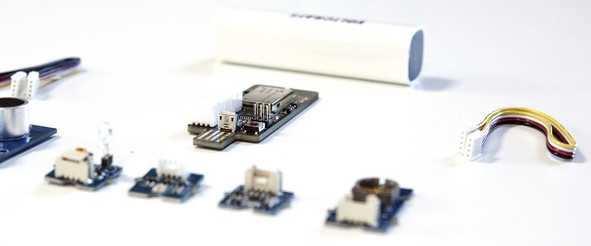LoRa appears to be one of the most popular LPWAN standards so far, with hobbyist development boards such as LoPy or LoRaONE, and we’ll soon have at least one more choice thanks to Marvin, a LoRa development board with a full size USB port.
- MCU – Atmel/Microchip ATmega32u AVR MCU (same as Arduino Leonardo board)
- Connectivity – LoRa via Microchip RN2483; Supports both 868 MHz and 433 MHz frequency bands, on-board antenna
- USB – 1x USB, 1x micro USB port for power and programming
- Debugging – USB, and ISP header
- Expansion – 5x Grove connectors
- Power Supply – 5V via USB port
- Dimensions – N/A, but similar to USB flash drive
The board can be programmed with the Arduino IDE, and they mention IBM Bluemix platform, and Node-RED, but overall details about documentation and software are scarce right now. One of the advantage of this form factor is that you can program it directly into your computer, and once you’re done you can plug it into a power bank easily without having to bother with any cables in the process.
 The board is based on RN2483 chip with 868 & 434 MHz frequency bands, so it will work in many countries in Europe, but it won’t work with LoRa networks in the US, Japan, New Zealand, etc.. where other frequency bands are used. You could use two Marvin for points to points communication in those countries, but you’d have to make sure 868 Mhz is not used by something else… LoRA is designed for low power long range communication for IoT project, and if you send messages of about 50 bytes at around 5000bit/sec, you’d be able to send about 300 messages per day. The LOS range is about 10 to 20 km.
The board is based on RN2483 chip with 868 & 434 MHz frequency bands, so it will work in many countries in Europe, but it won’t work with LoRa networks in the US, Japan, New Zealand, etc.. where other frequency bands are used. You could use two Marvin for points to points communication in those countries, but you’d have to make sure 868 Mhz is not used by something else… LoRA is designed for low power long range communication for IoT project, and if you send messages of about 50 bytes at around 5000bit/sec, you’d be able to send about 300 messages per day. The LOS range is about 10 to 20 km.
https://www.kickstarter.com/projects/688158475/marvin-the-lora-development-board/description
The project been launched on Kickstarter yesterday, and the developers have already surpassed their 10,000 Euros funding target with close to 16,000 Euros raised so far. All 60 Euros early bird rewards are gone, but you can still get the board for 70 Euros, as well as full suitcases with some Grove sensors and multiple Marvin boards. Most rewards will only ship to Europe, probably due to limitations discussed above, but somehow if you order a Marvin development suitcase (825 Euros) it will ship anywhere in the world. Shipping is included in the pledge, and delivery is scheduled for February 2017.

Jean-Luc started CNX Software in 2010 as a part-time endeavor, before quitting his job as a software engineering manager, and starting to write daily news, and reviews full time later in 2011.
Support CNX Software! Donate via cryptocurrencies, become a Patron on Patreon, or purchase goods on Amazon or Aliexpress






Hi.
Is it me or I cannot find a link to kickstarter?
Have a nice day.
@Greg
Sorry my bad. Updated post, or go directly to https://www.kickstarter.com/projects/688158475/marvin-the-lora-development-board
i can send sms on my $20 phone at a much faster rate per day to the other side of the planet.
No doubt Marvin is depressed. The first ten million years were the worst, and the second ten million they were the worst too. Then he went it a bit of a decline.
A Microchip RN2483 LoRa module costs less than $15 USD in unit quantity and around $10 in quantity. A legitimate ATmega32u micro-controller is about $5 in unit quantity and around $3.50 in quantity. The PCB and rest of the popcorn parts are low in cost. Yet they want $76 USD (EU 70) for one of these Marvin Kickstarter boards? I think that’s way too expensive. The product is a simple board with integrated hardware parts, there is no further value-added by the seller.
Just wait a little while. Soon these little LoRa boards will be dirt-cheap with low-cost shipping out Hong-Kong or Shenzhen; maybe even by the time these over-priced Marvin Kickstarter boards ship!
One more thing: Microchip offers a drop-in version of the RN2483 LoRa module that covers the 915 MHz ISM band used in North and South America. I’m surprised the Marvin Kickstarter didn’t offer this option. By doing so they locked themselves out of more than half their potential customer base.
Heck, here’s a randomly-chosen page selling all sorts of cheap LoRa breakout boards:
https://www.loriot.io/modems.html
Just hook up your own micro-controller to the LoRa module. No need to spend $76 bucks on a “Marvin” Kickstarter board… Or am I missing something here?
This is ridicously overpriced
An STM32 + LoRa module costs $10 and does more than this
@JM
i found Dorji modules at tintie.com, $6-7 each, shipping $3 first additional $0.10.
but dont find stm32+lora at $10, please, can you send the link?
Highly recommend open source RFLink firmware for Arduino to make your own:
http://www.nemcon.nl/blog2/2015/07/bb
You can either buy to parts and make it yourself or buy a kit from Nodo-Shop:
https://www.nodo-shop.nl/en/rflink-gateway/127-rflink-arduino-antenna.html